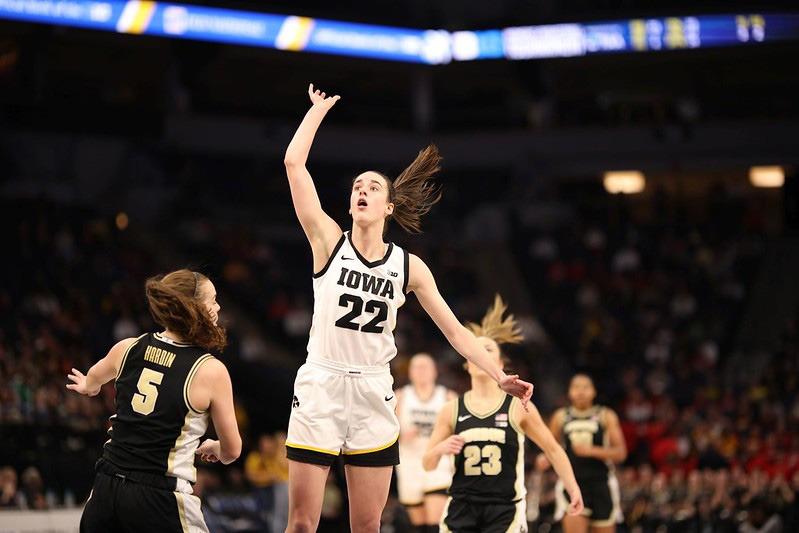Caitlin Clark, the Iowa basketball legend, brought women’s sports to never-before-seen heights this past season, and she may have catapulted the sports world into a new age of sports history.
Clark walked away from college basketball this month with a long list of NCAA women’s basketball records. The most prominent of which was Clark’s claim over the highest point total scored by an NCAA basketball player across both the men’s and women’s leagues.
Clark, while reaching her record number of points, led the Iowa Hawkeyes to a national championship visit in 2024. A year prior, in Iowa’s 102-85 loss in the 2023 women’s NCAA Championship to Louisiana State University (LSU), Clark developed a rivalry with LSU star Angel Reese.
As that championship game reached its final moments, Reese, sure of an imminent LSU win, pointed to her ring finger while staring down Clark. This gesture was seen as a sort of non-verbal trash talk, and it sparked tension between Reese/LSU fans and Clark/Iowa fans.
In the 2024 season, college basketball’s record-breaking Midwest star, Clark, and the reigning champion, Reese – and the rivalry between them – fueled the unprecedented growth of women’s basketball. Sports media outlets, radio shows and live TV broadcasts ate up the Clark-Reese rivalry and subsequent comparisons, with some arguing that in order for Clark to cement G.O.A.T. status in women’s college basketball, she needed to defeat Reese in the tournament.
This year, Clark got her chance.
After Iowa’s 89-68 second round win over the University of Colorado, the team was set to play a Reese-led LSU in the Elite Eight. Leading up to the game, hype was at an all-time high. Clark had set arguably the most influential college basketball record of all time in total points scored (among a barrage of other records), and all she had left to achieve was an NCAA title. Reese, the player that controversially showboated her way to an NCAA title against Clark the previous year, was seemingly ready to end Iowa’s season once again.
LSU, in their three NCAA Tournament games prior to the Elite Eight matchup, had a positive point differential of 46. Iowa, on the other hand, had a positive point differential of 57 through their three games. Simply put, both teams had steamrolled their competition in reaching the Elite Eight.
Leading up to the game, one common point of skepticism surrounding Iowa’s national championship chances was their reliance on Clark for any offensive production. By leading the league in just about every scoring category, Clark created a situation in which her teammates didn’t have to do too much on offense to win games. Clark’s season average of 31.6 points per game stood tall over Iowa’s next best scoring average: forward Hannah Stuelke’s 14.1 points per game.
One thing was glaringly obvious: if an opposing defense did manage to shut down Clark, Iowa would be doomed.
On the other side of the court, LSU was a more complete team – both offensively and defensively. Iowa had just three players averaging over 10 points per game, and LSU had six. Alongside this, none of those six LSU 10 point averaging players averaged over 20 points, which meant that if any one LSU player had a bad game, they wouldn’t be doomed offensively.
Nonetheless, the match began. LSU and Iowa fired away, and Clark unsurprisingly led the charge. Unbeknownst to the world at the time, the LSU-Iowa Elite Eight matchup would break more than scoring records; the game was, at that point, the most-watched women’s college basketball game of all-time.
At 12.3 million viewers, the game beat out last year’s World Series (11.48 million) and all but 5 of last year’s NBA finals games.
This proved two things; that people are eager to tune into women’s sports at the highest levels of competitiveness, and that women’s televised sports could rival the viewership, and thus the revenue, of some men’s televised sports.
The revolution didn’t stop there though. After Clark’s 41-point campaign led Iowa to an eventual 94-87 win over LSU, Iowa was set to play the University of Connecticut (UConn) in the Final Four.
As expected, the win over LSU drove the sudden tsunami of hype to an all-time high, and Iowa’s matchup against UConn rode on the coattails of that wave.
The matchup garnered an average of 14.2 million viewers (and peaked at 17 million), breaking ESPN’s all-time viewership record for any basketball game – men’s or women’s – that the network had ever broadcasted. Alongside this, it broke the all-time women’s basketball viewership record set just four days earlier in Iowa’s matchup against LSU.
After Iowa defeated UConn in that matchup, they were set to play South Carolina in the championship game. As expected, the records continued to be broken.
Iowa’s NCAA Tournament Championship matchup against South Carolina garnered an average of 18.7 million viewers, once again shattering the all-time women’s basketball viewership record. The game’s viewership average came in at over 3.5-million viewers more than the men’s NCAA Championship game, which averaged just 14.82 million viewers. Beyond ESPN ratings, the Iowa-South Carolina matchup was also the most watched basketball game across men’s and women’s NCAA, the WNBA and the NBA since 2019.
As the records piled up, a new possibility began to take shape in the minds of sports fans across the nation. This possibility, of course, revolves around the idea that we may have finally entered a pivotal age in sports history: one where both women’s and men’s sports are beginning to stand together in the spotlight, even at the highest levels of competitive achievement.







